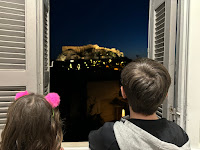 |
| View from our hotel |
Highlights of the trip for me were the things that engaged them. That includes staff at Manchester Airport spotting my son's sunflower lanyard and quietly, conscientiously making things a little easier for us all. Aegean Airlines were incredibly accommodating with families, such as ensuring that children on the flights got fed first and providing colouring books and card games.
Really, there was only one sour note to the trip. The Acropolis was very crowded and the narrow path up to it a bit of an ordeal, with many other tourists not behaving well - shoving past my daughter, standing on my feet so often I had to wash blood from my sandals, and ignoring ropes and signs closing off various bits of the site. It may just be that our pre-booked, mid-morning slot coincided with all the coach trips.
Other sites - the Temple of Olympian Zeus, Hadrian's library, the Greek Agora and its Roman counterpart - were bustling but less of a scrum. In contrast, we ducked into the Museum of Modern Greek Culture to escape from the sun and had the place pretty much to ourselves. It was a revelation, the various themed exhibits holding the children's attention for two hours.
I was wowed by the Acropolis Museum, where me and Lady Vader completed a treasure hunt of different representations of Athena and then had various games and activities. For the latter, we found a quiet corner on the second floor, where there's the awe-inspiring recreation of the Parthenon frieze and other ornamentation made up from original stonework and casts of the purloined pieces.
As we sat there, passing tourists kept voicing the same thought: once you see this incredible display, with the windows looking out on the Acropolis itself, it's hard to fathom how the British Museum can possibly object to sending its own bits of the Parthenon home.(The Lord of Chaos was much taken by the Lego version of the Acropolis on display on the floor below, where a pith-helmeted Lord Elgin can be seen nicking some of the sculptures - boo, hiss).
For all we explored the ancient past, we were also tracing more recent history - the corner of Syntagma Square where, in 2000, I first met the Dr's aunt and uncle (then residents of Athens, now sadly deceased), the bit of Monastiraki where in 2007 we whiled away an afternoon with my parents in a bar overlooking the Agora. I first went to Athens on a fancy school trip in 1989, when I was the same age as my son is now. Our trip to the Museum of Modern Greek Culture made me especially sensitive, I think, to that idea of interwoven, personal history.
At the same time, the coach-loads of tourists from America, Australia, Japan and wherever else make a different case. The Acropolis Museum focuses on the Greek history and the birthplace of democracy but there's little on why so many modern states trace a line back to this city, and how the ideas originated in Athens have been adapted. Uncivilised by Subhadra Das points out that ancient Athenians wouldn't recognise our modern political systems as "democratic"; I'd have liked to have seen more of the present in reading the past.
 |
| House of Simon |








1 comment:
Lovely!!! xx
Post a Comment